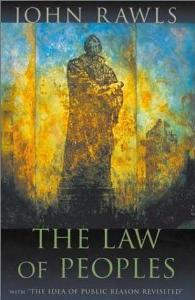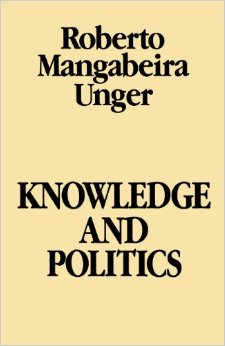
Justice, in its broadest sense, is the concept that individuals are to be treated in a manner that is equitable and fair.

John Bordley Rawls was an American moral, legal and political philosopher in the modern liberal tradition. Rawls has been described as one of the most influential political philosophers of the 20th century.

In politics, integralism, integrationism or integrism is an interpretation of Catholic social teaching that argues the principle that the Catholic faith should be the basis of public law and public policy within civil society, wherever the preponderance of Catholics within that society makes this possible. Integralism is anti-pluralist, seeking the Catholic faith to be dominant in civil and religious matters. Integralists uphold the 1864 definition of Pope Pius IX in Quanta cura that the religious neutrality of the civil power cannot be embraced as an ideal situation and the doctrine of Leo XIII in Immortale Dei on the religious obligations of states. In December 1965, the Second Vatican Council approved and Pope Paul VI promulgated the document Dignitatis humanae–the Council's "Declaration on Religious Freedom"–which states that it "leaves untouched traditional Catholic doctrine on the moral duty of men and societies toward the true religion and toward the one Church of Christ". However, they have simultaneously declared "that the human person has a right to religious freedom," a move that some traditionalist Catholics such as Archbishop Marcel Lefebvre, the founder of the Society of St. Pius X, have argued is at odds with previous doctrinal pronouncements.

Thomas Hill Green, known as T. H. Green, was an English philosopher, political radical and temperance reformer, and a member of the British idealism movement. Like all the British idealists, Green was influenced by the metaphysical historicism of G. W. F. Hegel. He was one of the thinkers behind the philosophy of social liberalism.

A Theory of Justice is a 1971 work of political philosophy and ethics by the philosopher John Rawls (1921–2002) in which the author attempts to provide a moral theory alternative to utilitarianism and that addresses the problem of distributive justice . The theory uses an updated form of Kantian philosophy and a variant form of conventional social contract theory. Rawls's theory of justice is fully a political theory of justice as opposed to other forms of justice discussed in other disciplines and contexts.
"Justice as Fairness: Political not Metaphysical" is an essay by John Rawls, published in 1985. In it he describes his conception of justice. It comprises two main principles of liberty and equality; the second is subdivided into fair equality of opportunity and the difference principle.

Paternalism is action that limits a person's or group's liberty or autonomy and is intended to promote their own good. Paternalism can also imply that the behavior is against or regardless of the will of a person, or also that the behavior expresses an attitude of superiority. Paternalism, paternalistic and paternalist have all been used as a pejorative for example in the context of societal and/or political realms and references.
In ethics and value theory, perfectionism is the persistence of will in obtaining the optimal quality of spiritual, mental, physical, and material being. Thomas Hurka describes perfectionism as follows:
This moral theory starts from an account of the good life, or the intrinsically desirable life. And it characterizes this life in a distinctive way. Certain properties, it says, constitute human nature or are definitive of humanity—they make humans human. The good life, it then says, develops these properties to a high degree or realizes what is central to human nature. Different versions of the theory may disagree about what the relevant properties are and so disagree about the content of the good life. But they share the foundational idea that what is good, ultimately, is the development of human nature.
"Two Concepts of Liberty" was the inaugural lecture delivered by the liberal philosopher Isaiah Berlin before the University of Oxford on 31 October 1958. It was subsequently published as a 57-page pamphlet by Oxford at the Clarendon Press. It also appears in the collection of Berlin's papers entitled Four Essays on Liberty (1969) and was reissued in a collection entitled Liberty: Incorporating Four Essays on Liberty (2002).

Political Liberalism is a 1993 book by the American philosopher John Rawls, an update to his earlier A Theory of Justice (1971). In it, he attempts to show that his theory of justice is not a "comprehensive conception of the good" but is instead compatible with a liberal conception of the role of justice, namely, that government should be neutral between competing conceptions of the good. Rawls tries to show that his two principles of justice, properly understood, form a "theory of the right" which would be supported by all reasonable individuals, even under conditions of reasonable pluralism. The mechanism by which he demonstrates this is called "overlapping consensus". Here he also develops his idea of public reason.
Richard E. Flathman was the George Armstrong Kelly Professor of Political Science, emeritus, at Johns Hopkins University. He is known for having pioneered, with Brian Barry, David Braybrooke, Felix Oppenheim, and Abraham Kaplan, the application of analytic philosophy to political science. He was a leading advocate of liberalism and a champion of individuality. He defended a conception of social freedom according to which it is "negative, situated, and elemental."

Joseph Raz was an Israeli legal, moral and political philosopher. He was an advocate of legal positivism and is known for his conception of perfectionist liberalism. Raz spent most of his career as a professor of philosophy of law at Balliol College, Oxford, and was latterly a part-time professor of law at Columbia University Law School and a part-time professor at King's College London. He received the Tang Prize in Rule of Law in 2018.

The Law of Peoples is American philosopher John Rawls' work on international relations. First published in 1993 as a short article, in 1999 it was expanded and joined with another essay, "The Idea of Public Reason Revisited" to form a full-length book. Rawls's basic distinction in international politics is that his preferred emphasis on a society of peoples is separate from the more conventional discussion of international politics as based upon relationships between states. It is an attempt to show "how the content of a Law of Peoples might be developed out of a liberal idea of justice similar to, but more general than, the idea I call justice as fairness".

Kantian ethics refers to a deontological ethical theory developed by German philosopher Immanuel Kant that is based on the notion that "I ought never to act except in such a way that I could also will that my maxim should become a universal law." It is also associated with the idea that "it is impossible to think of anything at all in the world, or indeed even beyond it, that could be considered good without limitation except a good will." The theory was developed in the context of Enlightenment rationalism. It states that an action can only be moral if it is motivated by a sense of duty, and its maxim may be rationally willed a universal, objective law.

Cornelius Adrian Comstock Vermeule is an American legal scholar who is currently the Ralph S. Tyler Professor of Constitutional Law at Harvard Law School. He is an expert on constitutional and administrative law, and, since 2016, has voiced support for Catholic integralism. He has articulated this into his theory of common-good constitutionalism.

The Public and Its Problems is a 1927 book by American philosopher John Dewey. In his first major work on political philosophy, Dewey explores the viability and creation of a genuinely democratic society in the face of the major technological and social changes of the 20th century, and seeks to better define what both the 'public' and the 'state' constitute, how they are created, and their major weaknesses in understanding and propagating their own interests and the public good. Dewey rejects a then-popular notion of political technocracy as an alternative system of governing an increasingly complex society, but rather sees democracy as the most viable and sustainable means to achieving the public interest, albeit a flawed and routinely subverted one. He contends that democracy is an ethos and an ongoing project that requires constant public vigilance and engagement to be effective, rather than merely a set of institutional arrangements, an argument he would later expand upon most influentially in his essay "Creative Democracy: The Task Before Us". The Public and its Problems is a major contribution on pragmatism in political philosophy and continued to promote discussion and debate long after its publication.
Liberalism is a political and moral philosophy based on the rights of the individual, liberty, consent of the governed, political equality, right to private property and equality before the law. Liberals espouse various and often mutually warring views depending on their understanding of these principles but generally support private property, market economies, individual rights, liberal democracy, secularism, rule of law, economic and political freedom, freedom of speech, freedom of the press, freedom of assembly, and freedom of religion. Liberalism is frequently cited as the dominant ideology of modern history.

The Demands of Liberal Education is a 1999 political philosophy book by Meira Levinson that establishes a liberal political theory of children's education that fits the mutual needs of the state and its diverse citizenry. She writes that the intent of a liberal education—an education that follows from a liberal society's values—is to maximize the autonomy of individual children through increasing their capacity for liberty. Levinson argues autonomy as a right to children. The book, published by Oxford University Press, aims to address a lacuna between educational policy and liberal political theory.

Knowledge and Politics is a 1975 book by philosopher and politician Roberto Mangabeira Unger. In it, Unger criticizes classical liberal doctrine, which originated with European social theorists in the mid-17th century and continues to exercise a tight grip over contemporary thought, as an untenable system of ideas, resulting in contradictions in solving the problems that liberal doctrine itself identifies as fundamental to human experience. Liberal doctrine, according to Unger, is an ideological prison-house that condemns people living under its spell to lives of resignation and disintegration. In its place, Unger proposes an alternative to liberal doctrine that he calls the "theory of organic groups," elements of which he finds emergent in partial form in the welfare-corporate state and the socialist state. The theory of organic groups, Unger contends, offers a way to overcome the divisions in human experience that make liberalism fatally flawed. The theory of organic groups shows how to revise society so that all people can live in a way that is more hospitable to the flourishing of human nature as it is developing in history, particularly in allowing people to integrate their private and social natures, achieving a wholeness in life that has previously been limited to the experience of a small elite of geniuses and visionaries.














